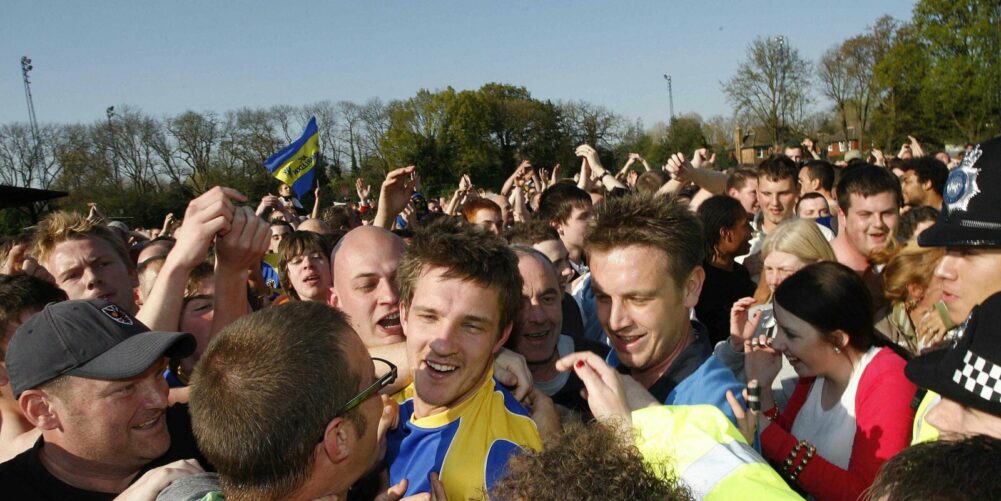DON IT: AFC Wimbledon fans mob Jon Main following their promotion to Non-League‘s top tier
By Chris Dunlavy
Lee Worgan vividly remembers the first time he encountered Jon Main.
“I was playing for Hastings United and we’d just been promoted to the Ryman Premier,” recalls the veteran keeper, now 36 and plying his trade at Dover Athletic.
“Tonbridge Angels was our third or fourth game of the season. They were quite big hitters at the time and we knew Mainy was the danger man. The year before, he’d got about 40 goals.
“But as the game went on, he didn’t do anything. He didn’t hold the ball up, he didn’t hassle our defenders. In the dressing room at half-time, we were kind of saying ‘What’s all the fuss about?’.
“We’d almost forgotten he was there. Then, in the 90th minute, he bought a yard, turned in the box and banged one in the top corner. That was it – 1-0, game over.”
It is a tale repeated again and again by those who knew a player widely regarded as one of the deadliest finishers the Non-League game has ever seen.
Main, a full-time electrician who couldn’t even get in his school team, scored 68 times in 86 starts for Tonbridge, then bagged 61 in 91 as part of a legendary partnership with Danny Kedwell as AFC Wimbledon seared from Step 3 to League Two. Previously, he’d run riot with Cray Wanderers and VCD Athletic.
“Jon wasn’t the best trainer in the world,” says Tony Dolby, player-manager at Tonbridge when Main arrived from Cray in 2006.
“He wasn’t one of those boys who loves football. He just scored goals. One game, he scored a worldie hat-trick for us and we beat Chelmsford City 3-0.
“They were the only three things he did all afternoon, but who cares? That was more than enough.”
Simon Bassey, now seeking a return to the dugout after a spell in recruitment at Millwall, was Main’s coach for four years at Wimbledon.
In 2008-09, the striker scored 33 times and was crowned Non-League Player of the Year as the Dons clinched the Conference South title.
“How would I sum up Jon?” Bassey says. “Technically not great. Physically not great. Tactically, not the brightest.
“You’d watch him objectively and say ‘Well, he doesn’t do that, he doesn’t do this, he can’t do that’. But then you look at his record and what do you see? Goals. Hundreds of them.
“He did the hardest thing in football and made it look like the easiest thing in the world.”
Worgan, who played alongside Main when the forward returned to Tonbridge in 2011, laughs when he hears the words of Bassey and Dolby.
“It’s true,” he says. “Mainy wouldn’t fight with defenders. He wouldn’t really run in behind. You’d tear your hair out playing with him. It was like ‘F***ing come on! Do something!’.
“But then he’d come alive in an instant. And when he did… bang. Head, left foot, right foot. He was so calm and clinical in the 18-yard box. And he had this amazing knack of scoring important goals.”
Naturally, the heavyweights took notice. After a 44-goal season for Tonbridge in 2006-07, Main spent time on trial with Wolves, MK Dons and Swindon. None, though, offered a contract and the big time never came knocking again.
Partly, that was down to injury. Following Wimbledon’s promotion to the Conference Premier in 2009, Main broke his foot.
Posterior cruciate, tendonitis and medial ligament problems then ravaged his knees to such an extent that he retired from football in 2013, at the age of just 32.
Yet he was also hamstrung by the specificity of his skillset in an era when forwards were increasingly expected to provide more than goals.
“Jon was an EFL finisher by any measure,” said Worgan.
“But as he was kicking on, I think the game was evolving and systems were changing.
“Everyone seemed to go one up top, one in behind. The role Jon played – a goalscorer playing off a target man – went missing. Mainy is a legend, an exceptional player. But if he came into Non-League now, where would he go?”
That view is endorsed by Bassey, who feels the Wimbledon side that won promotion from the National League in 2011 had outgrown their erstwhile spearhead, who spent much of that campaign on loan before seeing out his career with Dartford, Welling and Thamesmead.
“In the Conference Prem, we often played a diamond,” he explains. “Then it was 4-3-3. Neither of them suited Jon.
“He wasn’t a No.9 up on his own. He didn’t enjoy playing off the side. He just wanted to score goals. Unfortunately, the team had to come first.
“After that, I think he struggled mentally, which often happened post-Wimbledon. No disrespect to other clubs, but you go from being adored by 4,000 to watched by 400 elsewhere and it’s hard to get your head round.
“Could he have made it higher? He joined us at 27 and I actually said to him the other day, ‘If we’d got hold of you when you were 20, you’d be sat in a nice big house now’. Sometimes the penny drops late for a player and, with him, it probably dropped later than most.
“But I don’t think the story of Jon Main should be about what he didn’t do. It should be about what he achieved. The rise of Wimbledon would have been a lot slower without him.”
Dolby agrees. “Jon could have gone to a pro club young and maybe been a bit quicker or stronger,” he says.
“But there’s no saying he would have succeeded. And playing against top-class defenders at such a young age, he might never have built the confidence or the instincts that made him such a great player in Non-League. So let’s celebrate that.”
























